Copyright ©2007 PopEntertainment.com. All rights reserved.
Posted:
February 25, 2007.
The following
documents two 40-minute press conference sessions merged together that tell
the tale about Martin Scorcese's latest elaborate feature, The Departed,
one that finally has garnered him the top Oscar awards – Best Director and
Best Picture. Based on a Chinese crime trilogy, Infernal Affairs 1-3,
the original served to inspire a film that has all of Scorsese's brilliant
directorial stylizations but it also plays on his own riffs as well.
Normally, press conferences are a mad dash of clever quips and sly but
superficial responses. But when one includes such an auspicious crew as
Scorsese as well as actors Matt Damon, Leonardo DiCaprio, Vera Farmiga,
writer William Monahan and producer Graham King, it makes for a more
interesting event – and when there are two press conferences to draw on then
it's even more interesting.
Martin, doing cops
seem new for you. What are the similarities between gangsters and cops?
Martin Scorsese:
I think no doubt there are similarities – the old cliché of catch a thief,
set a thief. To catch someone in the underworld, to play against it, to try
to get them, and make apprehensions – I think Bill's depiction of that world
made me try again to work within a genre that dealt with Bill's depiction of
gangsters. I felt comfortable certainly with the guys in the street, guys in
bars and that sort of thing, and even more comfortable with the doctor
scenes.
But with the police
scenes, I did feel a little uncomfortable. I did sometimes get a little
nervous. It had a feel that I was guilty for something and I was worried
that there were cops all around me and they were gonna take me in. So I was
nervous a couple of times, but they made me feel comfortable. Duffy was
great to hang around.
What's up with
violence in your films?
Martin Scorsese:
I really don't know what to say. I've said many times I can't defend it. I
don't know if I approach it differently. I approach it the way I thought I
experienced, anyway – what I know, what I saw. Some people are more
impressionable than others. I was very affected by it. I can tell you more
than the physical violence; I was affected by the emotional violence around
me. It's part of who and what I am and somehow it channels itself into the
films, but I don't see it. I see it almost as absurd. In this film, the
violence is almost absurdity. There seems to be a lot of violence in films
that are like video games. If you want to experience violence, you should
experience violence powerfully and real.
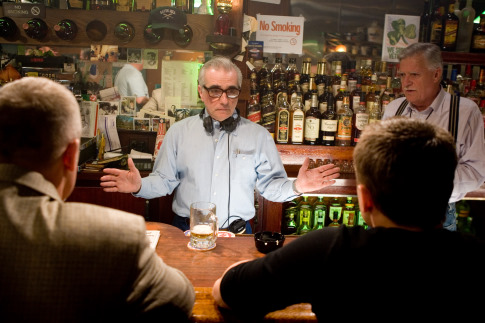 Why have your films
become more Irish in recent years? Will you return to Italian-centric
cinema?
Why have your films
become more Irish in recent years? Will you return to Italian-centric
cinema?
Martin Scorsese:
It's an interesting question. I've always felt a close affinity with the
Irish, particularly coming out of the same area of New York City – although
by the time the Italians moved in, by the 1920's, 1930's, most of the Irish
had moved out of that neighborhood. It goes back to Gangs of New York,
stories about the way Irish helped create New York, the city itself, and
America. Irish literature is very important to me and the poetry of the
Irish is extraordinary.
Yes, there were some
differences when they first moved into the same neighborhood. The Irish
sense of Catholicism is a very interesting contrast to the Italian sense of
Catholicism. Don't forget I do have a very strong love for Hollywood cinema,
and some of the greatest filmmakers to come out of Hollywood, were Irishmen:
John Ford, Raoul Walsh and others. How Green Was My Valley was about
Welsh miners, but it was directed by an Irishman. It had that warmth, the
family structure, and felt very close to the culture of the Irish – and the
Italians felt that. Besides, the script is written by William Monahan.
[Someone] talks about
crime as being a left-handed form of human endeavor. When you start to go
that way in your mind and you live by that in the street, it doesn't matter
whether it's Boston, Chicago, New York, or anywhere – it filters down to
survival of the streets. In the film you're talking about a society within a
society within a society. There's a war in the streets, and these guys know
what's going on from the beginning and if they make one mistake, they get
killed, they're dead. There's no place to run or hide. None. So you take
that as a philosophy of the situation and then your philosophy becomes
survival. I think as a human being, the differences between different ethnic
groups as quote gangsters, that's purely technical.
Why film Boston in
Brooklyn?
Martin Scorsese:
We didn't really shoot in Brooklyn. We shot in an armory in Brooklyn.
That's where there's a space. I think it was an issue of very good shooting
deal in New York as opposed to Boston. After looking at locations in Boston,
we thought we could double for things in Boston, but it's not easy. It's
difficult to rent, the bit players have to be from Boston, so we had to
bring them back from Boston, it got a little complicated. But it turned out
to be advantageous for us.
William Monahan:
Yeah, the tax break we got from shooting really helped out the production.
Also, when you're shooting interiors and you're building everything inside
you had to be really aware that it kept everyone in the same place and it
was convenient for everyone.
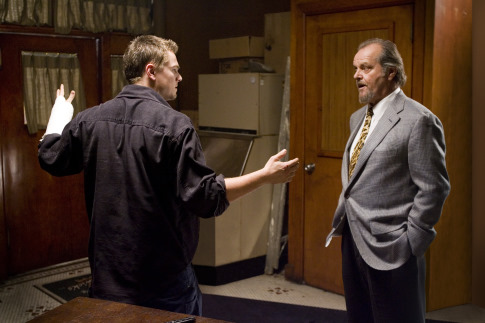 Marty, why did you do
a remake?
Marty, why did you do
a remake?
Martin Scorsese:
I'm aware of all the Hong Kong cinema. I felt it was okay because what they
do I cannot do. I have to find my own way and I think Bill's script was the
way. I think the microcosm that he described – the people, the way he
described them, the way they behaved, the language they used – that all
added up. The story of trust and betrayal, only set in the context of the
Irish Catholic world of Boston, the incestuous nature of the world that that
depicts. Both Matt's character and Leo's character have relationships with
Vera's character, but they never know that. Then you add Jack's character,
and all these characters are connected in this incestuous way.
We were able to
collaborate with Bill, Vera, Matt, Leo… and Jack bringing his own elements,
it all pulled together. Mark Wahlberg's attitude was very clear. Alec
Baldwin picked up on it beautifully and counterbalanced, it was almost like
an Abbott and Costello routine between Wahlberg and Baldwin. I didn't have
to say anything to them, they just did it. But this is really by Bill and
from Matt's placement.
Did Hong Kong
translate into Irish Boston?
Martin Scorsese:
I didn't think of it as Hong Kong. Taking from the Hong Kong trilogy, Andrew
Lau's film, it's the device, the concept of two informers. Whether I like it
or not, I am drawn to stories that have to do with trust and betrayal. I
just thought of how Bill Monahan put down a way of life, a way of thinking,
an attitude, a cultural look at the world, really, a very, very enclosed
society, and I liked the idea.
Once I saw John Woo's
The Killer. You can't go near that. Another Hong Kong film I saw in
the '80s was King Hu's The Touch of Zen. It's a whole other thing
going on there. We do what we do, and if we influence their culture at all,
it has come out through John Woo, Tsui Hark and Ringo Lam. The Hong Kong
cinema of Wong-Kar Wai and Stanley Kwan is something you have to appreciate
as a filmmaker because we see new ways of making narrative film.
Even if I said to
myself, gee, maybe I can make a film like John Woo, the minute I get to
design the shot or I get behind the camera with the cinematographer –
Michael Ballhaus in this case – well, many times I saw I'd done this shot
five times already in two other movies. I admire and respect their work so
much in Hong Kong. All of Chinese cinema really, Beijing and Taiwan. I hope
my next film is another remake of an Asian film. I'm only making Asian
remakes anymore.
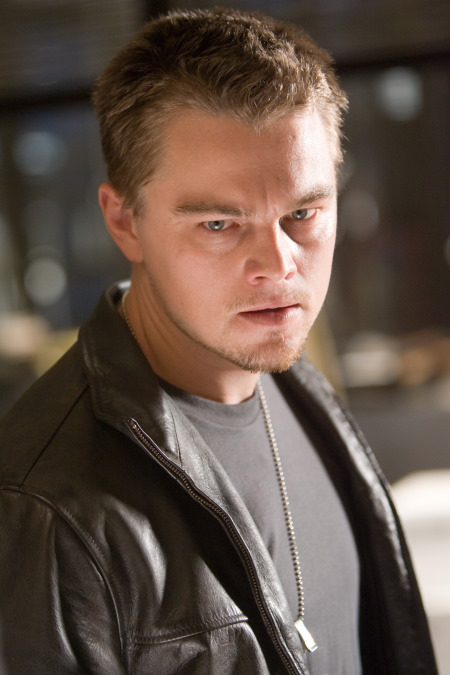 Leo, what is it about
Scorsese that attracts you to his films?
Leo, what is it about
Scorsese that attracts you to his films?
Leonardo DiCaprio:
Well, I'm a fan of his work, number one. It all started with wanting to work
with him doing This Boy's Life with Robert DeNiro. So I became a fan
of his work at a very early age. If you asked me [when I was] starting out
in the business, who I wanted to work with, it would have been Marty.
I got fortunate enough
to work with him on Gangs of New York in 2000. I think just from
there, we have a good time working together and we have similar tastes [in]
films. He certainly has broadened my spectrum as far as films that are out
there, the history of cinema and the importance of cinema, and it really
brought me to different levels as an actor. I look at him as a mentor.
Matt, how did you get
into this project?
Matt Damon:
Graham came to me because his company had access and I first heard about it
through him. It's like the dream of all dreams: Hey, did you hear that
Martin Scorsese is directing a movie about Boston? Then I got a copy of the
script and loved it and when I came back to New York, I met with Marty. But
I think I had already agreed to do it. Most of these things are contingent
on a meeting. I wasn't even trying to be cool about it – I'm in, so if he
needs to meet with me, I'll go meet him wherever he wants. It was a really
easy yes for me.
Leonardo DiCaprio:
I never had an initial conversation with Graham. I had received the script
and Bill Monahan's work is this tightly-woven, highly complex ensemble
piece, this gangster thriller. It's very, very rare in this business where a
script lands on your lap ready to go. This was one of those rare
occurrences. There was a certain amount of work; character development,
taking things out, changing dialogue, but to have the construct of the story
and really complex, duplicitous characters, information, disinformation,
plot twists, all leading to a satisfying ending, is something you hardly
ever get to in this business. So I know I got the script when Marty got it
and it was one of those things that we really didn't need to discuss. He
really wanted to do it. I really wanted to do it.
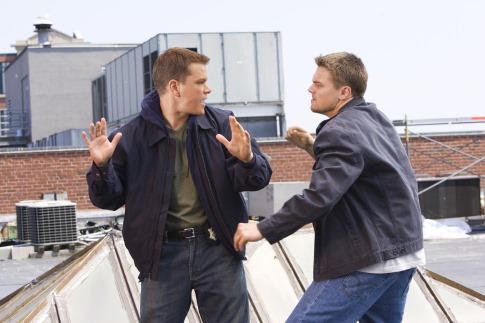 So Matt and Leo, can
each of you talk about why you picked your characters?
So Matt and Leo, can
each of you talk about why you picked your characters?
Matt Damon:
Leo and I both thought they were these incredible roles. I think we would
have been happy to play either one. We're happy [with] the way it turned out
because I can't imagine playing the other one. It's really rare in a film of
this budget to have characters this interesting. Generally the bigger the
budget, the less interesting the characters become. All of us had great
things to play, so that's a real credit to Bill Monahan and his script. To
be able to have that much to do when you go to work every day was really
great. And then we also heard the director had done a good movie here or
there, so...
Leonardo DiCaprio:
I agree with Matt 100%. These characters are two sides of the same coin in a
lot of ways. They come from different backgrounds but they each could have
easily made choices the other character made, depending on the
circumstances. It just happened that way.
Your characters don't
share screen time but they have to be very similar. So how did you make it
work?
Matt Damon:
The script makes it work, it is really well written. A lot of this was
already on the page, and as long as Leo and I both did our work and got
prepared and just played the scene without even thinking about that, and
just letting Marty sort it out, it was bound to work well. There are
similarities in the characters, they're the same guys, they're the same age,
from the same neighborhood, they're both pretending to be people they're
not, there's bound to be comparisons.
Leonardo DiCaprio:
Certainly, they're two sides of the same coin. They're products of their
environment. They make certain choices early on in their own lives that
affect everything that goes on in the film. I think the working experience
was interesting because it was almost like we were shooting two entirely
different films. Of course they intersected at moments, but they were
completely different experiences. But the moments that I did have with Matt,
I enjoyed them. He's an unbelievable actor, he really is.
I think there are a
lot of really, really interesting characters in this film. That's what I
love about Mr. Scorsese's work. He not only gives the same appreciation to
the entire film and the construct of the film, but he really lets the
audience engage with every character. No matter how small they are, each
character is fulfilling.
Martin, how did the
script develop on the shoot?
Martin Scorsese:
It evolved over a very long process. Ever since I've been making films, I've
loved talking about the processes between the writers, myself, and the
actors. But I've found over the years that it gets misunderstood. You really
have to be there. It's a collaborative process, there's no doubt. But the
basis is what Bill did, and he continued to do when it was called upon. When
he was called upon to evolve a character, it was usually with the actors and
myself. The editing also contributes greatly to what the film needed here or
there.
Mark Wahlberg's
attitude was very clear, Alec Baldwin picked up on it beautifully and
counterbalanced, it was almost like an Abbott and Costello routine between
Wahlberg and Baldwin. I didn't have to say anything to them, they just did
it. But this is really by Bill and from Matt's placement.
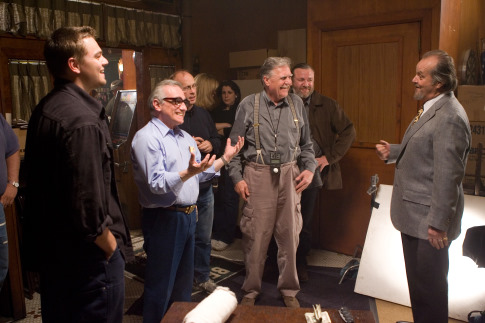 Did you have a lot of
changes for Jack's character?
Did you have a lot of
changes for Jack's character?
Martin Scorsese:
Nicholson worked in a different way, but that again is a private process. We
developed [Costello] a little different from what Bill had put in. Basically
we decided the date, the age, and the power of this man and the appearance
of his total coming apart with so much power, and yet he's falling apart.
This is the way I work, this is my process. The other actors can talk, but
we all worked together.
Was there anything
else to Nicholson's sex scene that was left out of the final cut?
Martin Scorsese:
It's got a lot of graphic sex and nudity and profanity in it, there's no
doubt. Since my early films like Taxi Driver, Raging Bull,
Mean Streets or whatever, the subject naturally for discussion has been
what you can do, how far you can go in a film and how far you can't.
What you see in the
film is the result of a lot of work during filming and getting the process
previewed. We previewed the film three times. Ultimately I decided what's
implicit is better than what's explicit in the bedroom scene or wherever.
Because we had been shooting around the cocaine, we came up with the device
of painting the ceiling blue, with stars on it. It reminded me of the Pope's
ceiling in Avignon, during the period that the Pope had moved from the
Vatican to Avignon. It was really interesting. You can't see it in the film,
but it's there. The opera, the slow motion of Jack's face, with the red
shoes, all of these elements come together so ultimately the implied is
better – the hallucinatory effect of the scene is what I wanted. When he
says, you want some coke, there it is. I'm more interested in where it is.
Then we decided in the porno theater, reality is better, so we did it more
explicit. We used a phallus and Frank C. looks like he's come from three or
four days and nights of whatever he was doing and he's out of his mind – and
now he was going to go talk to Colin about business.
He's creepy and Matt's
character's whole life is dependent on him – so is Leo's – and the man is
losing his mind. He doesn't care if he's caught. He's got all the drugs in
the world. He’s got all the women in the world. He’s got all the money in
the world. He doesn't need it. He's protected by the FBI. He doesn't care.
Jack and I were talking about it. He said, "I have it with me." I said you
want to take it with you and use it in the porno scene, it's up to you. He
said, "You want me to try to take it in the porno theatre." I said all
right; let me see what you wanna do with it in the porno theatre.
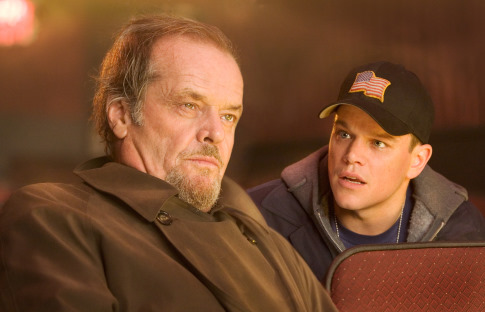 Matt and Leo, please
talk about working opposite Jack Nicholson in this film?
Matt and Leo, please
talk about working opposite Jack Nicholson in this film?
Matt Damon:
We have a lot of Jack stories. The first day I worked with him, he had been
working with Leo for about a week. It's Sunday night, I'm looking over the
script. We were shooting a scene in a movie theatre. I get a phone call.
"Hi, Matt? Marty. The director." I love that he always says Marty the
Director. I said, yeah, I know who you are. He said, "Well, a funny thing
has happened. Jack had some ideas for your scene tomorrow." And he goes,
"Okay, I'll just get to it. Jack's going to wear a dildo." I thought, uh,
ok, so I'll see you at seven?
So we went in the next
day and rehearsed it. Jack's idea was, "Here's the deal. I'm gonna come in.
I'm gonna sit there, in the overcoat, and I'm gonna pull out the big dildo
and we're gonna laugh." And I thought, ok, that's a really good way to get
into the scene. They have to meet there, and Jack really brought this
incredible new element, this new layer to that character. Kind of obscene…
but in a way that felt authentic. These guys really would sublimate sex into
violence and violence into sex. I don't know how much research he did or how
much he just intuited or what his process was exactly. But I found him
really committed to making the thing as believable and pushing the envelope
as much as he could. I'm sure there's a lot of stuff that didn't make the
final version.
Jack said, "I want to
keep giving too much in all of these scenes and then let Marty figure out
the level that's right for his film." That was really impressive just to see
how much he was thinking about it, how much work he was putting it into it,
and how obscene he was willing to be in order to be believable. I said, if
he's introducing this sexual element into this, then it's fair game in the
script and we have to reference it from Colin's standpoint. So what would
the effect be on Colin from this figure who's loomed over his entire life,
and who knows what's happened between them.
We had a lot of
conversations. Then we started rehearsing with Vera. Basically what we came
down to was, okay, we're in this macho world, and everyone's beating each
other up, everyone's knocking each other over the head with glasses and
pushing each other through walls. Jack's this sexual dynamo. I want to lose
every fight I'm in and I don't want my dick to work. I want to take an
aggressive run in the other direction. The film is going in all these new
directions, so we felt like we caught a lucky break when Jack introduced
this element because it really gave us a lot to play with, a lot to work on,
and it was real.
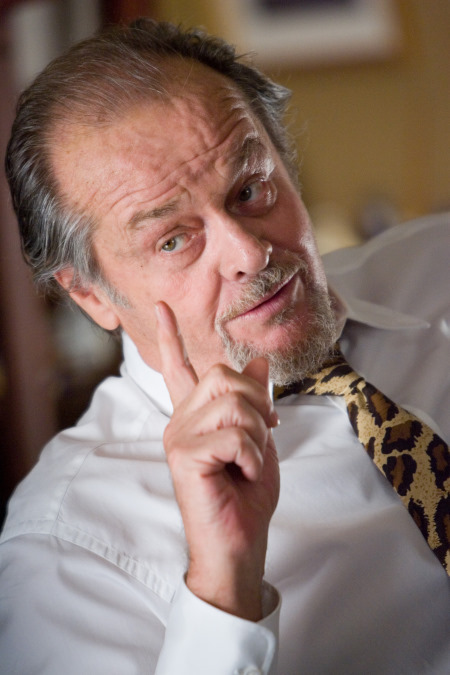 Martin Scorsese:
Because you can see it in the final touches as Jack's leaving the mark on
Matt's shoulder and on the expression in his face. He sort of recoils from
us. That's interesting, so we started following that up.
Martin Scorsese:
Because you can see it in the final touches as Jack's leaving the mark on
Matt's shoulder and on the expression in his face. He sort of recoils from
us. That's interesting, so we started following that up.
Matt Damon:
Then that scene where we're at the golf course, with Alec Baldwin where he
says, "a woman sees a ring on a guy's finger and she knows he's got a
certain amount of money and his cock works." So we just thought the line,
does my cock work? And he looks at me. I say, all the time. Then Alec goes,
"That's good." It really did seem to thematically fit with what Jack was
doing and it deepened the whole thing. Yeah, the obscene phone call, too.
Bill always had him threatening me while she was watching me. But the
language – Jack said, “Look if we're gonna do this, let's really do this.”
The way he talks to me about her while she's right there; it's really
obscene, and real.
Leonardo DiCaprio:
Well, as far as Jack was concerned, we expected the unexpected. We knew that
having Jack Nicholson join up with Martin Scorsese and play a gangster is
something I think a lot of movie fans have been waiting for. For me, there
were a number of different scenes where I had no idea what was going to
happen. One scene in particular. We did the scene one way, and I remember
Jack [telling] Marty he didn't feel that [Costello] was intimidating enough.
It was one of the table scenes. It was one of the most memorable moments of
my life as far as being an actor is concerned. I remember coming into the
scene one way and then I came in the next day and the prop guy told me, be
careful, he's got a fire extinguisher, a gun, some matches and a bottle of
whiskey. Some things are in the film that he did that day and some things
aren't.
For me, as an actor,
playing this guy that has to relay to the audience this constant 24-hour
panic attack that I'm going through for my life, surrounded by people that
would literally blow my head off if I gave them any indication of who I was,
coupled with the fact that I'm sitting across the table from a homicidal
maniac who will maybe light me on fire. That gives your character a whole
new dynamic. It completely altered and shifted the scene in a different
direction. I think we all knew that if Jack came on board he would grab the
reins with this character and let him be freeform. We all were completely
ready for that every day that we walked on the set. He had a short run, he
filmed his scenes and then he left. But those were some of the most intense
moments of the film. For me, certainly, there were some memories that I will
never forget.
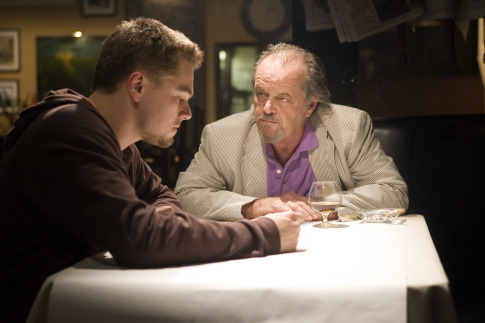 Matt and Leo, can you
talk about your experiences with violence?
Matt and Leo, can you
talk about your experiences with violence?
Matt Damon:
Growing up, I wasn't someone who fought a lot or anything like that. I saw a
lot of violent things happen, but probably not more than most kids growing
up in the city. My mother was a professor of early childhood and she
specializes in nonviolent conflict resolutions. I hear about portrayal of
violence in cinema all the time, particularly gratuitous violence, so I'm
careful not to do any of that. None of the violence in this film is
gratuitous and the characters all pay a price for their violence. That's a
good message to send out to people – that there's a price to pay.
Leonardo DiCaprio:
By watching Martin Scorsese movies, right? That form of immediate violence
really is not familiar to me, but that's what you do as an actor. If you
can't draw upon anything in your real life, you go meet people who have done
these things. Part of the process for me was going to Boston – I had never
spent any time there. I learned about the Boston subculture, meeting some of
the real people who were around during the late '80s, the Whitey era. I
really wanted to meet some guys from South Boston. I spent a lot of time
with a guy I met in Los Angeles who told me a lot of stories about the
streets. Boston's a really interesting place because everyone knows each
other's business. It's like a little microcosm there. Everyone waves to each
other on the street and they all have overlapping stories.
It was very important
to meet some of the real characters and get to know them and hear some
stories. I read a few books, but to be able to penetrate some of these guys
and really get deep into what they were thinking was important. We shot a
lot of it in New York; we should have shot some of it in Boston. We had a
great technical advisor named Tom Duffy, who knew the entire history of
Boston and what the streets were like. He was there throughout the entire
filmmaking process. And the police gave us unbelievable advice. Matt
actually went on a raid at a crack house.
Matt, can you discuss
going on a drug bust with police?
Matt Damon:
Yeah, have you ever seen the movie The Hard Way with Michael J. Fox?
That was me. Hey guys, do I get a gun? They're like, "Absolutely not, shut
up." I love sitting next to Marty, who'll reference 40 of the greatest films
ever made, and I'll say have any of you guys seen The Hard Way? As
Leo said, Tom Duffy was a huge resource for us. Leo got connected to some
people who were around Whitey Bulger. Duff was able to get me around the
police, and it was really fascinating. I had a real advantage because I'm
from Boston, so I didn't have to learn an accent or anything like that.
What I knew of the
state police was from the times that I got pulled over for speeding on the
pike. So to get in there and really see what these guys do was great. The
ride-along was a great experience. I was a lot closer to the action than I
was comfortable with, I'll tell you that. We did the whole deep breathing,
the little huddle, before we went in. They gave me a bulletproof vest and
put me at the end of the line of people who go crashing through the door.
They showed this guy. They had pictures of him. He was wanted on gun
charges, drug charges, and he was on trial once for murder but hadn't been
convicted – so it wasn't a room I would have gone running into. They went in
with twice as many people as they would normally go in with. This was in
Chelsea, Massachusetts, the Chelsea PD and then the state police were
assisting them.
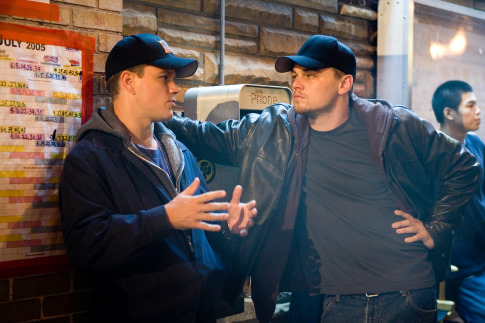 It was like how you
see it on COPS – they coordinate from both sides. They hit the door.
They ram the doors. They go running in with their guns drawn and if anyone
does anything they shoot them. It's very, very serious. So, I did that and a
couple other things. I listened in on a wire and I went on something they
called buy walks, which are undercover – the kind of thing that Leo's
character would do. They send somebody in to buy drugs and then they walk
away. They just slowly build a case and then they do a buy bust. Then the
guy makes the sale and they all come running from all directions. Then the
state police come and they [make the] arrest. It was really humbling to
watch these guys.
It was like how you
see it on COPS – they coordinate from both sides. They hit the door.
They ram the doors. They go running in with their guns drawn and if anyone
does anything they shoot them. It's very, very serious. So, I did that and a
couple other things. I listened in on a wire and I went on something they
called buy walks, which are undercover – the kind of thing that Leo's
character would do. They send somebody in to buy drugs and then they walk
away. They just slowly build a case and then they do a buy bust. Then the
guy makes the sale and they all come running from all directions. Then the
state police come and they [make the] arrest. It was really humbling to
watch these guys.
I told Marty and Bill,
this is a good way to establish Colin rising up because it follows this
progression and he keeps getting promoted. One of the ways of showing that
was showing the extremely aggressive and violent world that he was in.
Hitting a house, what happens and how they do it. The guys who are in the
shot with me are the guys who were really in the house with me. Any time you
get access like that, it's really the most amazing part of this job of
acting. So when we show up, hopefully the process is really smooth and the
result is believable. In all of Marty's film's there is an authenticity that
you just can't fake, because he uses a lot of real people and his actors
have access to these real people and get as much understanding of the people
that they're playing. Ultimately it's a giant magic trick. We're just trying
to be believable, and if you're taken out of the movie at all, then we
haven't done our job right.
Marty and Bill, the
last shot of the film [seemed] amusing. Where did it come from and what did
you intend by it?
Martin Scorsese:
I worked on that last shot a lot. It's an interesting thing. When I got to
the end of the script, I didn't know Bill or who even owned the script, or
who were the producers or the studio, I just knew the script. I took a long
time reading it too, about three and a half hours. There were some plot
issues, but it had to do with the way the characters were interacting and
the dialogue that Bill had in there.
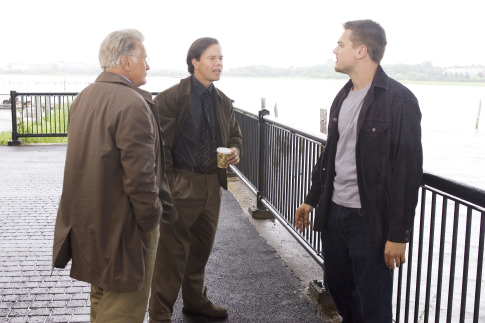 The attitude and the
stance against the world that they had, not only the main characters but the
parts played by Mark Wahlberg and Alec Baldwin… When I saw the shoot-out in
the elevator at the end, and then as Colin goes home and what happens to him
there, I was pretty stunned by it. I thought it was pretty strong and
truthful. Bill had written the phrase, "and then a strange thing happens, a
rat comes out and starts to eat the croissants." And I said, that's really
strange, that's interesting. It's like a comment from the filmmakers on the
subject matter. This is the nature of filmmaking: when you try to interpret,
and then a strange thing happens, one runs into difficulty – because the rat
comes in from the left, suddenly, it all looks too literal. Why isn't poetic
like he wrote it? It took me a while on that shot. It's what's in the
beginning of the frame and then as the rat is revealed; it's the statehouse
itself, the gold dome.
The attitude and the
stance against the world that they had, not only the main characters but the
parts played by Mark Wahlberg and Alec Baldwin… When I saw the shoot-out in
the elevator at the end, and then as Colin goes home and what happens to him
there, I was pretty stunned by it. I thought it was pretty strong and
truthful. Bill had written the phrase, "and then a strange thing happens, a
rat comes out and starts to eat the croissants." And I said, that's really
strange, that's interesting. It's like a comment from the filmmakers on the
subject matter. This is the nature of filmmaking: when you try to interpret,
and then a strange thing happens, one runs into difficulty – because the rat
comes in from the left, suddenly, it all looks too literal. Why isn't poetic
like he wrote it? It took me a while on that shot. It's what's in the
beginning of the frame and then as the rat is revealed; it's the statehouse
itself, the gold dome.
For me, it was a
throwback to the old gangster genre films. At the end of Scarface,
Tony Montana is shot in the street, there's a shot of a sign that says the
world is yours. I think the end of Little Caesar is the same way. Or
the end of White Heat; "Ma, top of the world." Well, the top of the
world to Colin was that Beacon Hill and the gold dome of the statehouse was
near it, which represents that. But it also represents for me, as the film
developed, a sense of paranoia and betrayal – one person never knowing who
the other person is or what the other person is doing, or if you can believe
anybody. It reflects the world now, the America that we know now, post
September 11th. So, all those elements are in there, but first on an
entertainment level as a reference back to the old gangster films.
William Monahan:
Well, what I was thinking at first was that after such an intense bloody
ending, we could go out with a little bit of a joke on the simplest level.
There's also the idea of the rat behind the wall of Colin's supposedly
perfect world. It worked beautifully, I think.
Are the three actors
here familiar with the Hong Kong film or the names Tony Leung and [actor]
Andy Lau?
Leonardo DiCaprio:
Yeah, we all watched it and we all enjoyed the film. But I think we had to
separate ourselves from it to a certain extent. Certainly, the construct and
the skeleton of the story are pretty similar, but it's an entirely different
underworld.
Matt Damon:
Yeah, I echo what Leo said. I loved the Hong Kong film. I thought it was
fantastic, and I loved those Hong Kong actors. But it's about such a
different culture. Boston is different even from any city here in America.
The structure was used from the Hong Kong version, but the world that Bill
built around it was very specific to Boston.
Vera Farmiga:
I didn't see the film. I only saw it after my work was complete. I hear that
[Madolyn] is a compilation of three female characters, which would have been
altogether confusing for me. I think Madolyn was going to be used in this
script to illustrate the differences and the similarities of these two
characters, so I just read from the script.
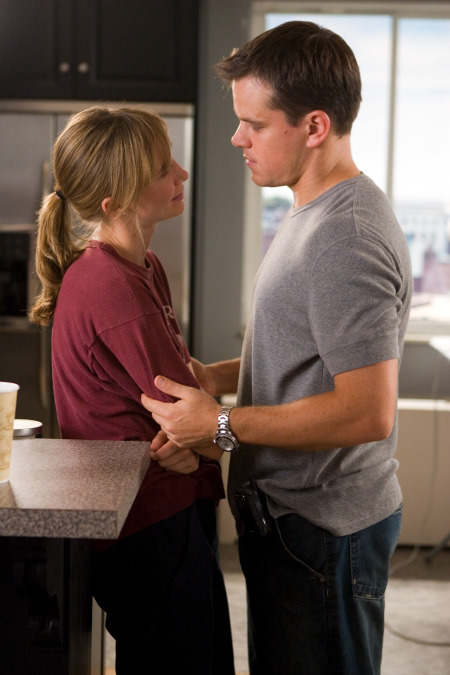 Marty, Vera has a
unique position in this cast of men. What drew you to her?
Marty, Vera has a
unique position in this cast of men. What drew you to her?
Martin Scorsese:
Ellen Lewis, our casting director, mentioned Vera to me. Then I saw a film
she did called Down to the Bone. It looked like an interesting film,
directed by Debra Granik. I had a very good experience watching that film. I
heard about how they worked on that film, that series of films in upstate
New York, and it reminded me of the early days of working in New York, 1958,
1959, 1960, making independent [productions], rewriting, revising with
actors, working with the people behind it. I thought this was interesting
for a person to pursue. You [to Vera] put yourself on tape during the
earlier scenes with Colin and I liked that. The next thing we do is meet and
I think you read with Leo, and I was sold. I like Vera's attitude. I wanted
someone to come in and enrich the part with Bill, with the actors, and again
that's part of the process. The world I depict in these films that Bill
wrote, it's male-driven. The action is male-driven. I've taken it down the
line to the very, very last minute of working on this film so that I could
get it right within the circumstances, and the female characters always seem
to be adjuncts in a way to the main plotlines. She feels a certain way about
morality, but she makes mistakes. She learns about herself. She's
duplicitous too, in a way. We wanted someone like Vera who was able to come
in and tell them what to do.
Vera Farmiga:
It truly was a collaborative process. I entered into this being prepared to
meet megawatts of talent and you expect there to be a certain chasm between
you [and them] and there wasn't. These guys were so nurturing and
encouraging and inventive. We spent a lot of time, the four of us – Bill,
Marty, Matt and I – and the process of working with Marty is he really [has]
you bring your own tumults and your own idiosyncrasies. It's a real
workshopping. There was a point where we discussed: Do we want to make her
more unbalanced in the film or do we want her as duplicitous as the rest of
them? I had met with a woman by the name of Debra Glasner who is a police
psychiatrist for the LAPD and I gave her the script. She looked at and
[said] "Oh, dear, no, she's doing everything wrong. No way would she sleep
with a client."
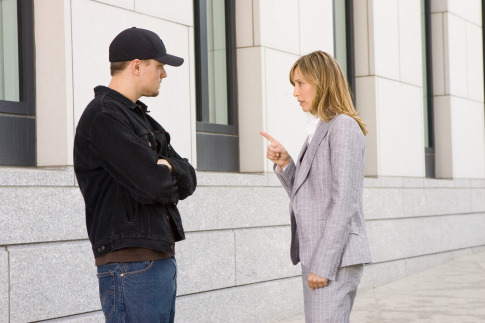 This was the moment I
found my character very interesting and this is when I said ah, something
for me to play. I think it would have been a bore if Madolyn did things by
the book. I think hardly anything in this world is done by the book. I think
it's so much more interesting to play someone who thinks she's great at her
job and may not be. She's as duplicitous as everyone else. She's pulled by
her desire and pushed by her conscience. And I love the contradiction. I
love that she is a woman who is supposed to rely on her instinct for her
what she does, but in her personal life does not rely on her intuition, and
I found that very exciting to play.
This was the moment I
found my character very interesting and this is when I said ah, something
for me to play. I think it would have been a bore if Madolyn did things by
the book. I think hardly anything in this world is done by the book. I think
it's so much more interesting to play someone who thinks she's great at her
job and may not be. She's as duplicitous as everyone else. She's pulled by
her desire and pushed by her conscience. And I love the contradiction. I
love that she is a woman who is supposed to rely on her instinct for her
what she does, but in her personal life does not rely on her intuition, and
I found that very exciting to play.
Matt Damon:
I think Marty's right about a male-driven film. It's like when you're a
young character actor and you have to do things that make no sense so that
the lead of the film can look better. But if you hire a great actor to take
a role, they can make everything work. In our rehearsing, our relationship
got a lot deeper and it made a lot more sense thematically. Now you have a
guy who's got sexual issues with this woman. She's a shrink, of course he's
gonna go to her and of course he's gonna be with her because if he's got
issues in his neighborhood, everyone's going to know about it. So he seeks
her out and she of course would stay with him and tough it out because of
what she does. Her first instinct is to try to help him. A lot of these
scenes would happen off camera, but our relationship works because it makes
sense why. Then it [also] makes sense why she would be susceptible to
Billy's attentions because she is unfulfilled in certain ways.
What about the music?
Martin Scorsese:
I worked out with Howard Shore that all the characters are entwined in a
web, and if they tried to get away from each other, they're tied together in
a dance of death in a way. We tried many different songs in the back of that
bar where Jack interrogates Leo with his combat boot, but the song "Let It
Loose," had the right particular feel for that scene. We came up with this
idea of a tango, a very dangerous and lethal tango which ultimately does in
everyone in the story. I love guitars. Howard and I had worked out acoustic
guitars and electric guitars, steel guitars, all sorts of different things.
When the sound kicked into electric, it was very strong. For example near
the end, when Vera finds the CD that Leo sends, there was a scene that
preceded it with Matt on the bed and she tells him about the sonogram. We
had that piece of music played on acoustic guitar and it was quite nice.
Then Howard said he had another version of it on electric guitar which gave
it a slight edge. But it started with this idea of the tango, something that
they're all entwined with, and of course the references to movies like "The
Third Man" you can't avoid, even the shot of him walking away from Leo at
the funeral. All those sorts of references to betrayal that you can't avoid…
I like them a lot.
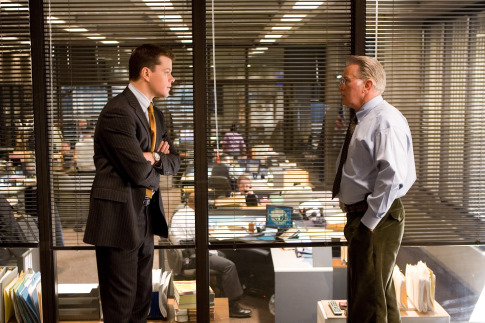 Martin, what would
Roger Corman think of you now, career-wise?
Martin, what would
Roger Corman think of you now, career-wise?
Martin Scorsese:
I did a couple films with Roger and was an editor in some of his films.
Don't forget the real guys who started out with him are people like Jack
Nicholson, Peter Bogdanovich, Monty Helm, Dennis Hopper and Peter Fonda.
They created the beginning of the New Hollywood in the late '60s, we came in
late a little after them. Roger always said "I made 100 films and not one
film has been lost or died. I made money on every one of them."
He had a whole
different way of making pictures. It was like a workshop, and it was called
an exploitation film and therefore it had to make money. It was interesting
to make a film like that – to go in and shoot in 24 days, it had to be out
in a certain period of time and it only went to a certain circuit. There are
certain films now that have replaced that. It's interesting because we
appreciate Roger as an artist, especially his Poe films that he made in the
early '60s. But I think he'd like to think of himself as a successful
businessman in film. So it's maybe hard for me to say what he would think.
What do you think of
the younger Martin Scorsese?
Martin Scorsese:
My younger Marty, I don't know, he's still there, I guess. It's almost like
a dream. I don't know what's really happened. I'm trying to find a way to
still be interested to be on a set and work with great people like this.
It's not easy to keep the energy going, to keep the curiosity going, to
continue to make films, but they have to mean something to me. That's always
been a struggle for me. Now [it's] the nature of how film is made,
independent cinema and that sort of thing, I'm still trying to find my way.
The decision to have
one character want religion and have one push it away; was that originally
in the script or was that added?
Martin Scorsese:
One embracing religion and one not, I never thought of that. A lot of work
in this film was intuitive. I never really thought that out. But I did
understand the corruption of power and havoc of Jack Nicholson's character
Costello. He's beyond power. He's beyond God. He's got all the money. He's
got all the drugs. He's got everything that he ever needs. But he's still
not satisfied and ultimately he sets himself up to be taken in by his sons.
William Monahan:
There was an overt reference in the script to a Luciferian revolt. When
Martin Sheen's character is followed, the cop who's following him says, what
are we supposed to observe, the good Catholic life? So with Irish Catholics,
you sometimes have to really take a big jump to get away from their
formative environments. James Joyce [is] the best example. He based his
whole career on the idea of Lucifer and the revolt, so there is an element
of that there.
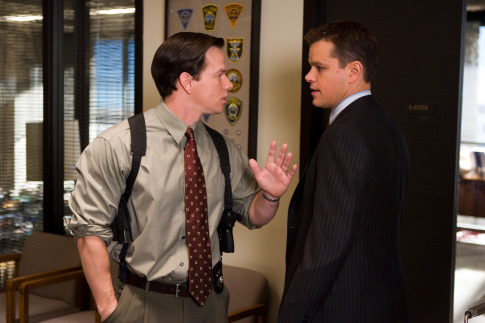 Is this a moral ending
or a just ending? How does reflect on American morality?
Is this a moral ending
or a just ending? How does reflect on American morality?
Martin Scorsese:
I think that's a good question. What I immediately related to in Bill
Monahan's script is that it's like a picture and I don't know what it is.
It's like an obsessive behavioral pattern on my part to be dealing with this
material, but this film is a little different. I felt a kind of despair
that's reflected in the story, in the characters and how they all interact
with each other, and particularly in the ending. How the whole plot is
resolved in the elevator, in the hallway, and of course in Colin's apartment
in the end.
William Monahan:
I like the finality of the ending. I like the fact that it's a truly tragic
ending in [that it] proceeds from the mistakes made by the people. And not
just one, but two of the principal characters end up with a tragic death
that has come about from the mistakes they have made and where they were in
the world and what they were doing. Vera's character comes to an endless
grief because of the mistakes her character has made.
Martin Scorsese:
That's what kept me going in depicting this world where morality no longer
exists. Costello knows this. I think he's almost above it. He knows that God
doesn't exist anymore in the world they're in. I think in order to know you
have a problem, first you have to know you have a problem. As we were making
the film I realized that we're in a moral Ground Zero in a way. For me it is
a sadness and a sense of despair, and we've been in this situation since
September 11th.
Email
us Let us know what you
think.
Features
Return to the features page.
